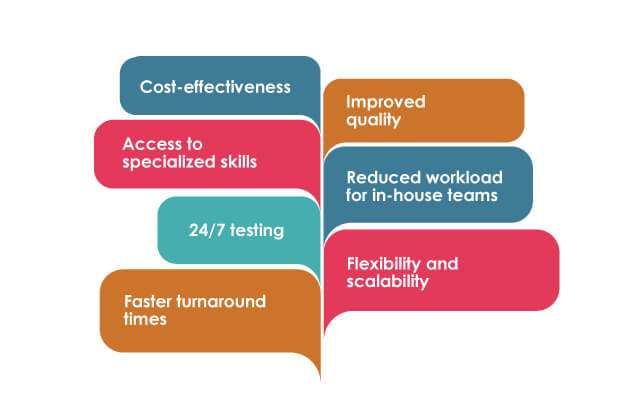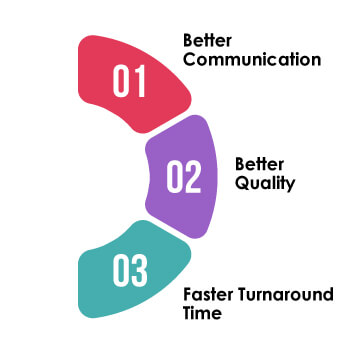Understanding Offshore vs Onshore Software Testing Models

In today’s digital age, software testing has become an essential part of any business that relies on technology. As the software industry continues to evolve, so does the need for high-quality software testing. Two common approaches to software testing are offshore and onshore models. Both models have their advantages and disadvantages, and choosing the right one can be a daunting task for any organization. This blog takes a closer look at offshore vs. onshore QA models and how digital businesses can choose the ideal QA model as per their needs.
Offshore Software Testing at a Glance

Offshore software testing refers to the practice of outsourcing or setting up in-house software testing center in a different country. This approach is becoming increasingly popular as it allows businesses to benefit from a range of advantages, such as cost savings, access to specialized expertise, and the ability to work around the clock with teams in different time zones.
Advantages of Offshore Software Testing

Offshore software testing can offer a number of advantages, including:
Cost-effectiveness:
One of the primary advantages of offshore software testing is the cost savings it can offer. Companies can benefit from lower labor costs in countries where wages and other operating costs are lower.
Access to specialized skills:
Offshore software testing can provide access to specialized skills and expertise that may not be readily available in-house. This can help ensure that the testing process is conducted more effectively and efficiently.
24/7 testing:
Offshore software testing teams can work around the clock, providing a 24/7 testing environment. This can help accelerate the testing process and reduce time-to-market for software products.
Faster turnaround times:
Offshore testing teams can often provide faster turnaround times for testing projects due to their larger team sizes and the ability to work on projects around the clock.
Improved quality:
Offshore software testing teams often have access to the latest testing tools and technologies, as well as highly skilled testing professionals. This can help improve the quality of the testing process and the final product.
Reduced workload for in-house teams:
Outsourcing software testing offshore can help reduce the workload for in-house teams, allowing them to focus on other critical tasks and projects.
Flexibility and scalability:
Offshore software testing can offer greater flexibility and scalability, allowing companies to scale their testing efforts quickly and easily up or down as needed.
Onshore Software Testing at a Glance

Onshore software testing is the process of testing software applications where you outsource or set up an internal team located in the same geographic location of the organization. This testing approach is becoming increasingly popular due to the benefits it offers, such as better communication, cost-effectiveness, and faster turnaround times.
The onshore testing team works closely with the organization to understand requirements and expectations, and then designs a testing strategy that meets those needs. They typically use a variety of testing techniques and tools, such as manual testing, automated testing, regression testing, and performance testing, to ensure the software is of high quality.
Advantages of Onshore Software Testing

Onshore software testing refers to a software testing practice where the testing is done by a team located within the same country as the development team or the client. Here are three advantages of onshore software testing:
Better Communication:
Onshore software testing teams are in the same country as the development team or the client. This makes communication between the two teams much easier as they speak the same language and are more likely to be in the same time zone. This leads to fewer misunderstandings, faster response times, and a better overall testing experience.
Better Quality:
Onshore software testing teams have a better understanding of the local market, cultural nuances, and customer preferences. This helps them identify potential issues or bugs that an offshore team may miss. Onshore testers are also more familiar with the local industry standards and regulations, which ensures that the software meets the necessary compliance requirements.
Faster Turnaround Time:
Onshore software testing teams can work in the same time zone as the development team or the client, which enables them to provide faster feedback and resolve issues more quickly. They can also respond to urgent requests and provide quick turnaround times for critical issues. This helps to ensure that the software is delivered on time and with the required quality standards.
Offshore vs Onshore: How to Choose Your Ideal QA Model?

Choosing between offshore and onshore QA models depends on several factors, such as project requirements, budget, time zone differences, communication, and cultural differences. Here are some considerations to help make an informed decision:
Cost:
One of the most important factors to consider is the cost of the QA model. Offshore QA models are often less expensive than onshore models because labour costs are lower in countries such as India and China. However, digital businesses also need to consider other factors, such as time zone differences and the need for additional communication channels to bridge the gap.
Time zone differences:
If an organization has global operations, they may need QA services that can work around the clock. In this case, an offshore model may be the best option, as teams can work in different time zones to ensure that testing is happening continuously.
Cultural and language differences:
When working with offshore teams, cultural and language differences can present challenges. If a business chooses an offshore model, they need to ensure that the QA team understands the business goals and can communicate effectively with the onshore team.
Quality of work:
Quality of work is a critical factor when choosing a QA model. While offshore QA models can be less expensive, they might face language and cultural barriers in some instances. However, these challenges can simply be overcome through effective channels and streamlined project planning, eventually leading to higher productivity.
Security and intellectual property concerns:
Offshore QA models may present security and intellectual property concerns, as sensitive data and proprietary technology may be more vulnerable to cyber threats. Onshore models may offer better security and protection for intellectual property.
Conclusion
In conclusion, when it comes to selecting the ideal QA model for a project, it is essential to consider the specific requirements, constraints, and priorities. Both offshore and onshore QA models offer their unique benefits and challenges. While offshore QA may be more cost-effective, onshore QA provides better communication, cultural alignment, and quality control. Ultimately, the decision should be based on a thorough assessment of the project’s needs and the available resources. By carefully evaluating the pros and cons of both models, digital businesses can make an informed decision that will lead to a successful project outcome.
How Does TestingXperts’ Engagement Models Offer the Best of All Worlds?

TestingXperts (Tx) is one of the Top 5 pure-play software testing services providers globally. Tx has been chosen as a trusted software testing outsourcing company by Fortune clients and ensures superior testing outcomes for its global clientele. We have rich expertise in enabling end-to-end testing services for global clients across various industry domains like healthcare, telecom, BFSI, retail & eCommerce, etc.
TestingXperts provides customized engagement models that can be tailored to meet the specific needs of your business. Companies often encounter challenges related to team dynamics, budget limitations, and changing business priorities. In order to achieve a successful project outcome, it is essential to adopt a personalized engagement approach that aligns with various requirements. You have the option to select from a range of engagement models outlined below or adopt a customized hybrid approach.
Project-based Model
Project-based testing engagement with agreed deliverables or resources to help meet your project
• Ideal for immediate project testing requirements to be fulfilled
• Meet project milestones with certainty of high product quality
• Fixed Cost or T&M pricing model based on scope and project plan clarity
• Managed QA Model
• Partnership model with end to end testing services ownership based on firm service levels for long
• Drive to focus on core business and willingness to trusting a specialist service provider for QA
• Outcome-based services as per the service levels with low effort on governance, allowing you to focus on your core business
• Fixed Cost and/ or T&M pricing model
Staffing/T&M QA Model
• High skilled resources on vast skill sets to work from global locations, including onsite (at client’s location), offsite (at TestingXperts’ onsite locations), offshore (at TestingXperts’ India) or hybrid
• Ideal for immediate resource needs in generic or niche skillsets to augment the testing team/ deliver a project, with need for high flexibility to ramp up or ramp down
• High flexibility to ramp up or ramp down in quick time, with usage-based billing
• T&M pricing model








